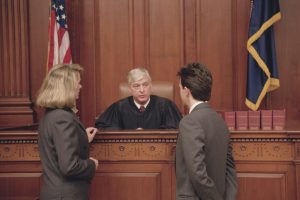 It doesn’t matter your experience level. Do the preparation you need to so that the clerks and the court — and maybe even your adversary — learn to look to you as the source of law and facts.
It doesn’t matter your experience level. Do the preparation you need to so that the clerks and the court — and maybe even your adversary — learn to look to you as the source of law and facts.
On my very first day as an assistant district attorney, both the actual district attorney and my bureau chief gave the rookies lectures on certain parts of our job. While some of what they said might have been cliché, I admit that I was sometimes moved and I remember it all, including our obligations to justice and to defend the Constitution of the United States. But the single piece of advice or direction I use the most — indeed, I use every time I’m in front of a judge or arbitrator — is our obligation to be the best lawyer in the courtroom.
That’s a bit of tough advice for someone who just took the bar exam weeks before to swallow. Good, necessary advice it remains. No matter how long you’ve been out of law school, you need to make sure you know the facts better than anybody else, you know the law better than anyone else, and that you have thought through the possibilities of what will take place in court better than anyone else in that courtroom or arbitration hearing room, even the judges and arbitrators themselves.

Humans in the Loop: The People Powering Trusted Legal AI
As the use of artificial intelligence permeates legal practice, a critical question confronts every legal professional who uses these tools: Can I trust this?
Of the three I’ve listed, there really is no excuse not to be better than anyone with the first two. It comes down to knowing your case. Yes, as you get more experienced you likely will develop better ways of remembering facts and law. My colleagues and I at our firm have particular techniques for how we organize facts, timelines, and the impact of relevant authority (special-sauce type stuff I probably won’t write about in this column). But as with anything in litigation, there may be a rule — here the rules are Know the Facts, Know the Authority — but you need to follow your own style, your own way of following the rule. Figure out how to make sure when you walk into a court room you know the facts and law better than anyone.
Recently I saw the benefit of knowing the facts and law better than anyone. I was in a business court where our adversary is considered amongst the top litigators in the entire state where we were. But I simply knew the case better than he did, and, as such, over the course of an argument the judge more and more looked to our side for answers to questions, whether they were about what had happened in the dispute, or in the litigation, or even what certain authority provided. And the adversary even stopped challenging our view on certain things as the hearing went on. That’s what you want: for your law finder (and, in an evidentiary hearing, your fact finder) to look to you for the answers, and even for a good adversary to realize that he will not help by challenging you.
Now the third element I mentioned of being the best lawyer in court — thinking through the possibilities better than anyone — is admittedly tougher when you’re younger. I’ve worked with some great lawyers at my firm, including younger ones and, frequently, no matter how hard they work, the younger ones have absolutely no idea what really is going to happen during an argument or hearing.
That’s fine; we really do get better at this with time. As someone with multiple teenage children, I have to remind myself that, yes, experience actually does matter in life since goodness knows that they are sure that that is not the case. Something that develops with experience is the instinct of what is important in a given case, what your judge will care about, and what the jury may find interesting (though we unfortunately do not have as much input on that last point as I wished). The fact that it’s hard to guess how things will play out when you are younger is, of course, no excuse. Do your best. And if at all possible, talk through your matter and your upcoming argument/hearing/deposition with a more senior lawyer. Humbly trust her instincts — even if she is not assigned to the matter — as to what the judge or arbitrator will care about. Indeed, whenever you can, run your case by colleagues, even as I acknowledge that there are only so many hours in the day and you remain responsible for deciding how to proceed. We get too close to our cases sometimes, and you want someone else to come in and help decide what is important and what is not. That becomes especially helpful if you’re a younger lawyer trying to guess what may happen when you’re finally in court on a matter.

Transform Legal Reasoning Into Business-Ready Results With General AI
Protégé™ General AI is fundamentally changing how legal professionals use AI in their everyday practice.
As a first-year assistant district attorney, every private adversary I faced had more experience than me, and every judge had been out of law school many dozens of multiples of the time I had been. But that did not change my obligation to be the best lawyer in the courtroom, one I have now, and one which every trial lawyer reading this has. To win for your clients, be the best lawyer for your clients, period.
 John Balestriere is an entrepreneurial trial lawyer who founded his firm after working as a prosecutor and litigator at a small firm. He is a partner at trial and investigations law firm Balestriere Fariello in New York, where he and his colleagues represent domestic and international clients in litigation, arbitration, appeals, and investigations. You can reach him by email at [email protected].
John Balestriere is an entrepreneurial trial lawyer who founded his firm after working as a prosecutor and litigator at a small firm. He is a partner at trial and investigations law firm Balestriere Fariello in New York, where he and his colleagues represent domestic and international clients in litigation, arbitration, appeals, and investigations. You can reach him by email at [email protected].